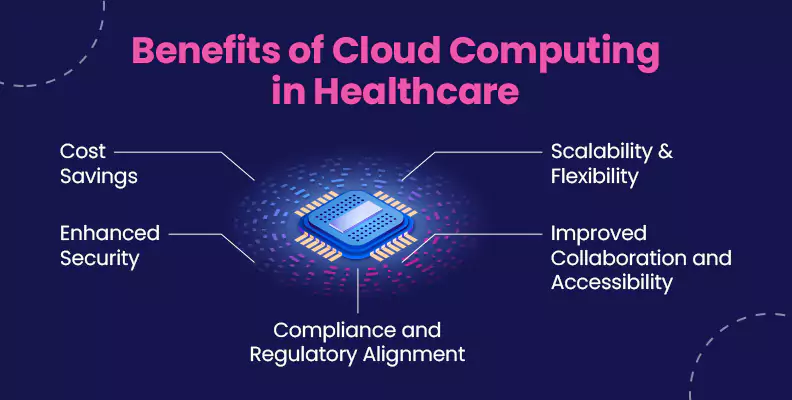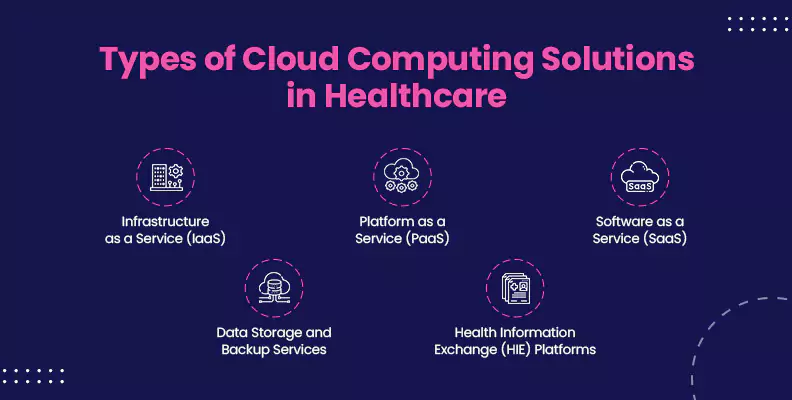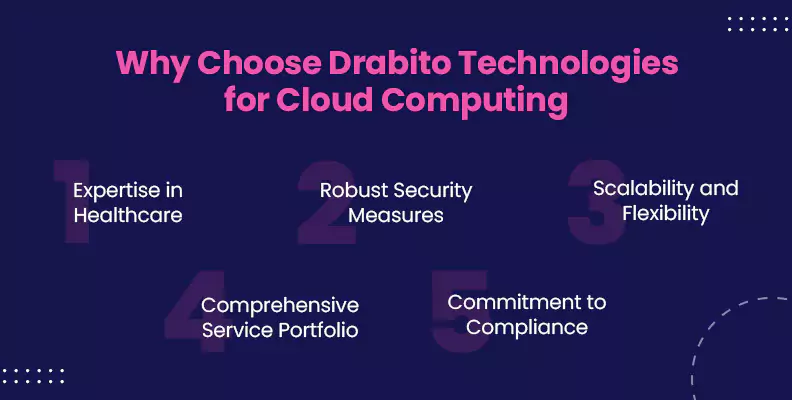Loading.....
Cloud Technology is Perfect for a Changing Healthcare Landscape

In today’s fast-paced world, where every second counts and seamless access to information is crucial, the healthcare industry is witnessing a remarkable evolution powered by cloud computing. Beyond just technological advancements, cloud computing in healthcare is fundamentally changing how we care for one another. In this blog post, we explore the profound impact of cloud computing on healthcare, delving into its benefits and how it's reshaping the industry with a focus on people – patients, caregivers, and healthcare professionals alike.
Understanding Cloud Computing in Healthcare
Cloud computing in healthcare refers to the use of remote servers hosted on the internet to store, manage, and process healthcare data and applications. Instead of storing data on local servers or personal computers, healthcare organizations can now leverage the power of the cloud to access their data securely from anywhere, at any time.
Cloud computing in the healthcare industry encompasses a wide range of services, including:
- Data Storage: Cloud-based storage solutions allow healthcare providers to securely store large volumes of patient data, including electronic health records (EHRs), medical imaging files, and administrative documents.
- Application Hosting: Healthcare applications such as Electronic Medical Records (EMRs), Picture Archiving and Communication Systems (PACS), and telemedicine platforms can be hosted on the cloud, providing scalability and accessibility to users.
- Data Analytics: Cloud computing enables healthcare organizations to leverage advanced analytics tools to analyze large datasets and derive valuable insights that can improve patient care, operational efficiency, and decision-making.
Benefits of Cloud Computing in Healthcare

The adoption of cloud computing in the healthcare industry offers numerous benefits, including:
- Cost Savings: Cloud computing eliminates the need for expensive hardware infrastructure and maintenance costs associated with traditional on-premises systems. Healthcare organizations can pay for cloud services on a subscription basis, reducing upfront capital expenditures.
- Cost Savings: Cloud-based solutions offer scalability, allowing healthcare providers to easily scale up or down their IT resources based on changing needs and demands. This flexibility is particularly beneficial for healthcare organizations experiencing rapid growth or fluctuations in patient volume.
- Enhanced Security: Contrary to common misconceptions, cloud computing can actually enhance data security in healthcare. Cloud service providers employ robust security measures, including encryption, access controls, and regular data backups, to protect sensitive patient information from unauthorized access and cyber threats.
- Improved Collaboration and Accessibility: Cloud-based systems enable seamless collaboration and information sharing among healthcare providers, regardless of their geographic location. This improves care coordination, facilitates remote consultations, and ensures that patient data is readily accessible to authorized users whenever and wherever it is needed.
- Compliance and Regulatory Alignment: Cloud service providers often adhere to stringent regulatory standards and compliance requirements, such as HIPAA (Health Insurance Portability and Accountability Act) in the United States. By partnering with reputable cloud vendors, healthcare organizations can ensure that their data management practices comply with industry regulations and standards.
Join the 73% of businesses already benefiting from cloud applications! Connect with us to get started with a cloud solution that will help you grow your business.
Types of Cloud Computing Solutions in Healthcare
Cloud computing in the healthcare industry encompasses various types of solutions tailored to meet the unique needs and requirements of healthcare organizations. Some of the key types of cloud computing solutions in healthcare include:

- Infrastructure as a Service (IaaS): IaaS provides healthcare organizations with virtualized computing resources, including servers, storage, and networking, delivered over the internet. Healthcare providers can leverage IaaS to deploy and manage their own virtual infrastructure without the need for physical hardware. This enables scalability, flexibility, and cost savings by eliminating the need for on-premises infrastructure maintenance.
- Platform as a Service (PaaS): PaaS offers a development and deployment environment for healthcare applications, allowing developers to build, test, and deploy software applications without the complexity of managing underlying infrastructure. Healthcare organizations can utilize PaaS solutions to accelerate the development of custom healthcare applications, such as electronic health record (EHR) systems, patient portals, and telemedicine platforms.
- Software as a Service (SaaS): Software as a Service delivers healthcare applications and software solutions over the internet on a subscription basis, eliminating the need for healthcare organizations to install, manage, and maintain software locally. Common examples of SaaS solutions in healthcare include electronic medical record (EMR) systems, practice management software, and medical billing platforms. SaaS offers scalability, accessibility, and automatic updates, enabling healthcare providers to focus on delivering quality patient care without the burden of software maintenance
- Data Storage and Backup Services: Cloud-based storage and backup services provide healthcare organizations with secure, scalable, and cost-effective solutions for storing and protecting patient data. These services offer features such as data encryption, redundancy, and automatic backups to ensure the integrity and availability of healthcare data. Cloud storage solutions enable healthcare providers to securely store electronic health records (EHRs), medical imaging files, and administrative documents, while backup services help mitigate the risk of data loss due to hardware failures, natural disasters, or cyber attacks.
- Health Information Exchange (HIE) Platforms: HIE platforms facilitate the electronic exchange of health information between different healthcare organizations, providers, and stakeholders. Cloud-based HIE platforms enable secure and interoperable data exchange, allowing healthcare providers to access and share patient information across disparate systems and networks. These platforms support care coordination, improve clinical decision-making, and enhance patient outcomes by ensuring that relevant health information is readily available to authorized users when and where it is needed.
Why Choose Drabito Technologies for Cloud Computing
When it comes to implementing cloud computing solutions in the healthcare industry, choosing the right technology partner is crucial to success. Drabito Technologies stands out as a leading provider of cloud computing solutions tailored specifically for the healthcare sector. Here's why healthcare organizations should consider partnering with Drabito Technologies

- Expertise in Healthcare: Drabito Technologies specializes in serving the healthcare industry, with deep domain expertise and understanding of the unique challenges and requirements of healthcare organizations. With years of experience working with healthcare providers, Drabito Technologies possesses the knowledge and insights needed to deliver customized cloud computing solutions that address the specific needs of healthcare organizations.
- Robust Security Measures: Security is paramount in healthcare, where the protection of sensitive patient information is a top priority. Drabito Technologies employs robust security measures and best practices to ensure the confidentiality, integrity, and availability of healthcare data stored in the cloud. From data encryption and access controls to regular security audits and compliance checks, Drabito Technologies prioritizes security at every level to safeguard patient privacy and maintain regulatory compliance.
- Scalability and Flexibility: Healthcare organizations need scalable and flexible IT solutions that can adapt to changing needs and evolving technology trends. Drabito Technologies offers scalable cloud computing solutions that enable healthcare providers to expand or shrink their IT infrastructure based on demand, without incurring the cost and complexity of managing physical hardware. Whether it's accommodating seasonal fluctuations in patient volume or scaling up to support new clinical initiatives, Drabito Technologies ensures that healthcare organizations have the agility and flexibility they need to succeed.
- Comprehensive Service Portfolio: Drabito Technologies offers a comprehensive portfolio of cloud computing services designed to meet the diverse needs of healthcare organizations. From infrastructure as a service (IaaS) and platform as a service (PaaS) to software as a service (SaaS) and data storage solutions, Drabito Technologies provides end-to-end cloud computing solutions that empower healthcare providers to streamline operations, enhance collaboration, and improve patient care.
- Commitment to Compliance: Compliance with regulatory standards and industry regulations, such as HIPAA, is non-negotiable in healthcare. Drabito Technologies is committed to helping healthcare organizations navigate complex compliance requirements and maintain adherence to regulatory standards when leveraging cloud computing solutions. By partnering with Drabito Technologies, healthcare providers can trust that their data management practices align with industry regulations and best practices, reducing the risk of regulatory violations and potential penalties.
- Proven Track Record: Drabito Technologies has a proven track record of delivering successful cloud computing implementations for healthcare organizations of all sizes and specialties. With a focus on customer satisfaction and outcomes, Drabito Technologies works closely with clients to understand their unique needs, challenges, and goals, and collaborates to design and implement tailored cloud solutions that drive tangible results and ROI.
Get in touch with experts to discuss your cloud solution.
Conclusion
Cloud computing is revolutionizing the healthcare industry by providing scalable, cost-effective, and secure solutions for data storage, management, and analysis. By embracing cloud technology, healthcare organizations can unlock new opportunities for collaboration, innovation, and improved patient outcomes. However, successful adoption requires careful planning, rigorous security measures, and a commitment to regulatory compliance. As cloud computing continues to evolve, its impact on the healthcare industry is poised to grow, driving further innovation and digital transformation in the years to come. By choosing Drabito Technologies, healthcare providers can unlock the full potential of cloud computing to innovate, collaborate, and transform the delivery of healthcare services, while ensuring the highest standards of security, compliance, and patient care.
 Back to blog
Back to blog












